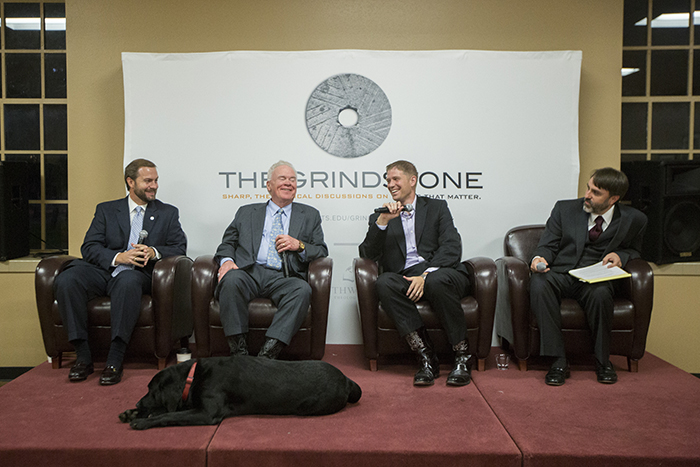Grindstone panel discusses key issues of 2016 presidential election

The culmination of the 2016 presidential race is rapidly approaching, and fittingly, the Oct. 20 Grindstone panel discussed what is at stake for Christians as they make final decisions for their vote, and how the church should interact with the world of politics at large. Panelists included Southwestern President Paige Patterson, Associate Professor of Ethics Evan Lenow, and Rep. Matt Krause from the Texas House of Representatives. Madison Grace, assistant professor of Baptist history and theology, moderated the discussion.
“Many of you are going to be church leaders guiding your flocks,” Krause said. “Pastors and churches could do a lot more and speak out a lot more and have a greater impact on the political discourse than many of them do. … Make sure your church is involved in what is going on outside the walls of the church, or soon you won’t be able to do what you love to do inside the walls of the church.”
What makes the 2016 presidential election especially important, Patterson explained, is the great impact the next president will have on the appointment of the federal judiciary. “Over the next eight years—if the person gets two terms—that president is going to appoint anywhere from a third to a half of the total federal judiciary,” Patterson said. “How you vote in this election is going to determine how the federal judiciary goes, so your ability to have some sort of religious liberty for all the rest of your life is bound up in how you vote in this election.”
While voicing their commitment to the party that stood for the pro-life platform, panelists also acknowledged the difficulties of voting for candidates reputed for dubious moral character. “I think moral character should be a point of consideration,” Lenow noted. “We simply find ourselves in a current political situation where neither of the candidates for president have any, and we seem to be at a general loss of moral character in government as a whole.”
Although the panelists expressed respect for evangelical Christians who are considering voting for a third-party candidate out of moral concerns, they pointed out that these conscience-driven votes may not be effective in any practical way. “I can respect somebody who votes for a third-party candidate,” Lenow said, “but there is really no distinction, in my mind, between voting for a third-party candidate and just simply not voting for the office of president, because it has the exact same effect.”
During the following Q&A session, Mercy Robinson, a student in the College at Southwestern, asked Krause how the younger generation of evangelical Christians could influence U.S. politics positively in future elections. Alluding to Nehemiah, who rebuilt the wall around Jerusalem section by section, Krause answered by noting that Christians can make a difference in their individual communities, which can then lead to nationwide impact.
“I don’t know if there is one single bullet or one single thing that we can do to turn this whole thing around,” Krause said. “But I know that you can get involved in your precinct. After you go vote, especially in the primaries, you can go to your precinct conventions right after that for whichever party you get involved in. … Identify candidates that you can get behind and really do all you can to help them.”
“You can get the right candidates in the School of Boards and on the city councils, and then the mayors,” Krause continued. “And they become your county commissioners and county judges. They become your state senators and state legislators and governors and senators. … You don’t have to build a wall around the entire city, just your precinct, your zip code. Start there, and I think you can make a big difference.”



